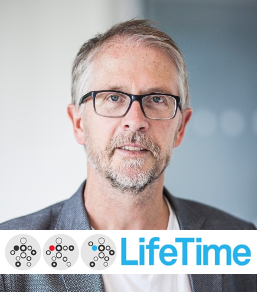International initiative seeks to improve healthcare through cell-based medicine
The research initiative LifeTime represents more than 50 European universities, including Aarhus University. A new Perspective article in Nature, co-authored by Jørgen Kjems from iNANO and Department of Molecular Biology and Genetics, outlines LifeTime's vision of how to revolutionize healthcare through personalised, cell-based interceptive medicine.

To form a functioning, healthy body, our cells follow developmental programs to acquire specific roles in tissues and organs. But when cells deviate from their intended course, they accumulate potentially dangerous changes that remain undetected until disease symptoms appear. At this point, medical treatment is often invasive, expensive and inefficient.
However, new technologies allow us to capture the molecular makeup of individual cells and detect the emergence of disease. Using breakthrough single-cell and imaging technologies in combination with artificial intelligence and personalized disease models would allow us to not only predict disease onset at an earlier stage, but also to select the most effective therapies for individual patients.
Eager to transition technologies for early prediction of disease into applied medicine
The perspective article “LifeTime and improving European healthcare through cell-based interceptive medicine” published in Nature on the 7th of September explains how these technologies should be rapidly co-developed, transitioned into clinical settings and applied to major disease areas.
LifeTime Initiative coordinator Professor Nikolaus Rajewsky (Max Delbrück Center, Berlin) explains: "LifeTime has brought together scientists across fields – from biologists, to clinicians, data scientists, engineers, mathematicians, and physicists – to enable a much improved understanding of molecular mechanisms driving health and disease.'
Professor Jørgen Kjems from the Interdisciplinary Nanoscience Center (iNANO) and the Department of Molecular Biology and Genetics represents the Danish node of LifeTime. 'Technologies for single-cell analysis have undergone rapid development in recent years and we are eager to see them transition to more clinical settings. The use and development of single-cell analysis is a strategic focus for iNANO and Biomedicine and it is therefore highly valuable for Aarhus University to be part of the LifeTime Initiative.'
LifeTime hopes that the Perspective article in Nature and the accompanying Strategic Research Agenda will serve as inspiration for funders and policy makers in supporting the future of personalised medicine.
Rajewsky, Almouzni, Gorski et al: LifeTime and improving European healthcare through cell-based interceptive medicine. Nature 2020. https://www.nature.com/articles/s41586-020-2715-9
Read more about LifeTime and the strategic research agenda on the initiative's website (https://lifetime-initiative.eu)
Contacts
Interdisciplinary Nanoscience Center (iNANO) & Department of Molecular Biology and Genetics:
Jørgen Kjems, Professor, jk@mbg.au.dk
Anne Færch Nielsen, Center Manager, afn@inano.au.dk
LifeTime:
Valentin Popescu, MDC Berlin, +49 30 9406-2136, valentin.popescu@mdc-berlin.de
